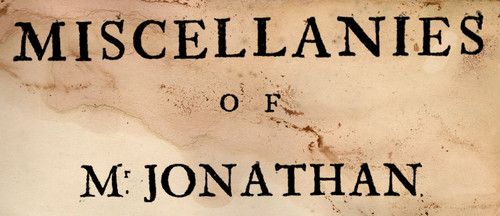From If I May, by A. A. Milne:
***
He had taken her to the best restaurant in Paris and had introduced her to a bottle of the famous Chateau Whatsitsname, 1320 (or thereabouts).
***
I have a book called Chats on Old Furniture--a terrible title to have to ask for in a shop, but I asked boldly.
***
I have not yet discovered, in spite of my recent familiarity with house-agents, the difference between a fixture and a fitting. It is possible that neither word has any virtue without the other, as is the case with “spick” and “span.” One has to be both; however dapper, one would never be described as a span gentleman. In the same way it may be that a curtain-rod or an electric light is never just a fixture or a fitting, but always “included in the fixtures and fittings.”
[...]
The whole idea of a fixture or fitting can only be that it is something about which there can be no individual taste. We furnish a house according to our own private fancy; the “fixtures” are the furnishings in regard to which we are prepared to accept the general fancy. The other man’s curtain-rod, though easily detachable and able to fit a hundred other windows, is a fixture; his carpet-as-planned (to use the delightful language of the house-agent), though securely nailed down and the wrong size for any other room but this, is not a fixture. Upon some such reasoning the first authorized schedule of fixtures and fittings must have been made out.
It seems a pity that it has not been extended. There are other things than curtain-rods and electric-light bulbs which might be left behind in the old house and picked up again in the new. The silver cigarette-box, which we have all had as a birthday or wedding present, might safely be handed over to the incoming tenant, in the certainty that another just like it will be waiting for us in our next house. True, it will have different initials on it, but that will only make it the more interesting, our own having become fatiguing to us by this time.
***
“Oh!” she says.
I hate people who say “Oh!” It means that you have to begin all over again.
“I’ve been playing [golf] this afternoon,” we try. “Do you play at all?”
“No.”
Then it is no good telling her what our handicap is.
“No doubt your prefer tennis,” we hazard.
“Oh no.”
“I mean bridge.”
“I don’t play any game,” she answers.
Then the sooner she goes away and talks to somebody else the better.
“Ah, I expect you’re more interested in the theatre?”
“I hardly ever go to the theatre.”
“Well, of course, a good book by the fireside--”
“I never read,” she says.
Dash the woman, what does she do? But before we can ask her, she lets us into the great secret.
“I like talking,” she says.
Good Heavens! What else have we been trying to do all this time?
***
[And dig this! In a piece deploring the state of the theatre, Milne's hypothetical crass theatre producer "would be just as proud of a successful production of Kiss Me, Katie, as of Hamlet." Now, if I'm not mistaken, this gag about the presumably fictitious Kiss Me, Katie was written a couple of decades before the debut of Kiss Me, Kate--which, as you no doubt know, was *based* on a Shakespeare play! (Milne then goes on about Hug Me, Harriet and Cuddle Me, Constance.)]
Also recommended: this item called "A Lost Masterpiece."
http://www.gutenberg.org/files/7365/7365-h/7365-h.htm#article28



